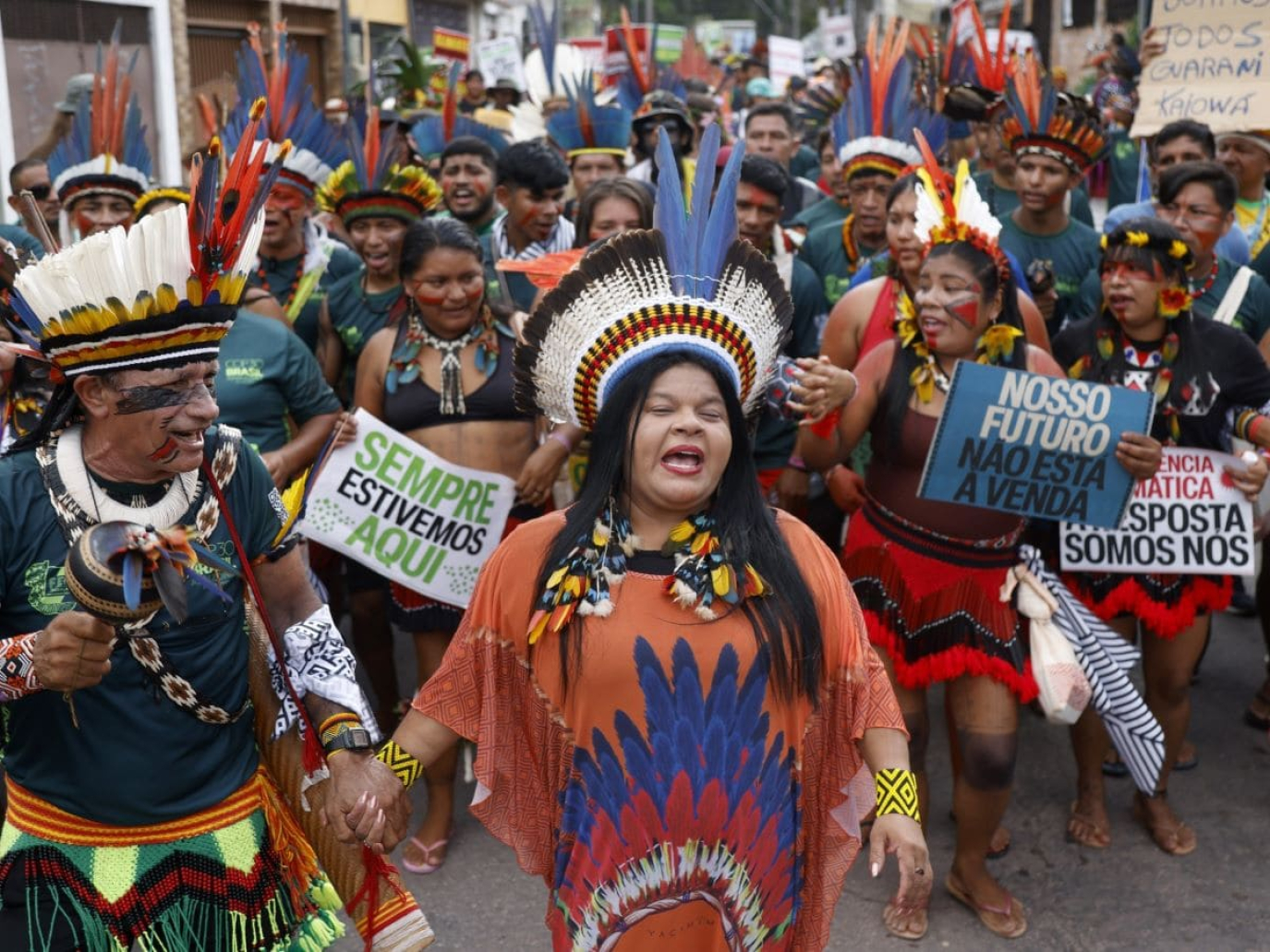
The 30th United Nations Climate Change Conference is taking place in a location that is at once symbol and battleground of the ongoing crisis: the Amazon. The forest, a treasure trove of biodiversity and essential climate regulator, has long been a land of conquest for global agribusiness, as hectares of greenery are eroded every day by the expansion of cattle pastures and soybean crops destined for international markets. A contradiction that the indigenous peoples, gathered in the Cúpula and Embaxiada dos Povos, have not failed to point out.
The corporate interests of the agrifood sector are front and centre at the COP in Belém, with a stronger presence than ever before. Over the last four years, the number of agribusiness representatives attending climate summits has almost tripled. So, while science confirms that the industrial food system is responsible for about a third of global greenhouse gas emissions (continuously increasing), the big multinationals in the sector continue to present themselves as part of the solution, when in reality they are fuelling the problem and aggravating its consequences.
Those same companies invest hundreds of millions of dollars in lobbying to block environmental and health regulations. It is the same strategy already seen with oil companies: deny, delay, confuse. The difference is that Big Meat's lobbying activities have an even higher budget (proportionally) than Big Oil's. And the results are clear: at the COP in Baku, we have already seen how effective these actions are in shaping the outcome of negotiations.
Belém therefore becomes the symbol of a broader battle: on one side, indigenous peoples and social movements that defend the forest and the rights of small producers; on the other, agribusiness giants that, through lobbying and trade agreements such as Mercosur, attempt to consolidate an extractive, predatory and destructive model.
In Brazil, intensive agriculture and land-use changes account for over 70% of national emissions. Giants such as JBS and Marfrig epitomise a model that deforests, concentrates wealth and marginalises small producers. Unsurprisingly, the demands of Brazilian agricultural giants seek to “tropicalise” emissions metrics, minimising the impact of methane, or to obtain credits for soil carbon capture projects, an option favoured by the industry but deemed by science to be insufficient to offset the sector’s growing footprint.
It is in this context that the Cúpula and the Emaxiada dos Povos, the “counter-COP” of indigenous peoples and social movements, are taking shape. It is no coincidence that the Global Climate March, which crossed Belém on 16 November, was one of the most heavily attended climate demonstrations in recent years. The city was enlivened by an unprecedented mobilisation: around 50,000 people filled the streets in a march that saw indigenous peoples, activists and citizens from all over the world come together, joined by the demand for climate justice and the defence of the Amazon. Once again, indigenous communities were at the heart of the mobilisation, reaffirming their role as guardians of the forest and their need to be heard in international negotiations.
The “counter-COP” strongly condemns the connection between large agri-food multinationals and trade agreements such as Mercosur, which Via Campesina activists describe as a “gift to agribusiness” and a threat to farmers’ rights and nature. The agreement, which I am fighting against along the Green Group in the European Parliament, paves the way for large meat and soy exporters, while small producers remain excluded from international markets. The result is unfair competition that puts European producers at a disadvantage, forcing them to rival against less sustainable and less protected systems.
Behind agribusiness there are not only intensive farmers, but an entire system of services and supplies: patented seeds, feed, pesticides, leather. The more agreements based on large volumes are pressed for, the more this supply chain is strengthened, which concentrates power and marginalises those who produce sustainably. It is no coincidence that speculation over agricultural commodities has exacerbated crises such as the one in Ukraine: the problem was not a lack of wheat, but its transformation into a tool for financial exploitation.
Opposing Mercosur thus means opening the path to another way of doing trade, based on respect for people and the environment. The proposal by Via Campesina and the Cúpula dos Povos is heading in this direction: building agreements that protect farmers’ rights, food sovereignty and biodiversity, instead of promoting the expansion of intensive and destructive models.
We, as Greens, are taking action on several fronts. In Brussels, together with 145 MEPs from different political groups, we have asked the Court of Justice of the European Union for an opinion on the compatibility of the EU-Mercosur agreement with the European Treaties. It is a crucial step: if the Court were to give a negative opinion, the agreement would definitively be blocked. We oppose Mercosur because it jeopardises public health and food safety, and opens the door to pesticides that are banned in Europe and meat treated with hormones.
But we are not stopping there. We want to expose the hypocrisy of double standards on plant protection products: at present, Europe prohibits the use of neurotoxic and harmful products on its territory, but allows their production and export to third countries, from which foods treated and “cleaned” with chemical washes are then imported into European countries.
This incredible journey back and forth across the Atlantic Ocean is totally unacceptable: if a plant protection product is banned here as it poses dangers to health, it remains hazardous in South America too. We cannot consider Brazilian or Argentine farmworkers and farmers to be second-class human beings. For this reason, our proposition is clear: to ban not only the internal use but also the export of these products. This decision must be taken as soon as possible, as the situation is getting worse. Despite the European Commission’s promises to put an end to this practice, exports of banned plant protection products from the EU have actually increased by 50% since 2018, reaching 122,000 tonnes in 2024.
The Cúpula dos Povos and the protests organised by indigenous peoples in Belém over the last few days remind us that COP is not just a matter of agreements between states, of numbers and technicalities, but of social and environmental justice. Defending the Amazon means defending the rights of indigenous peoples, small producers and, at the same time, European citizens who demand healthy and safe food. It means opposing a model of development that concentrates power and destroys community resources.
The future of agriculture cannot be left in the hands of agribusiness. A paradigm shift is required: from exploitation to food sovereignty, from intensive farming to agroecology, from profit for the few to well-being for the many. We must stop focusing solely on profit, which is always variable in free trade agreements. Instead, we must defend a model of trade that respects and protects the work of those who cultivate the land and produce food around the world. To us, this is a pillar of food security and sovereignty for local communities, for countries and, ultimately, at the global level. This is the challenge we are pursuing, both within and outside institutions, alongside the movements that are raising their voices in Belém for a different possible world.
Cover: Sonia Guajajara, Brazilian Minister for Indigenous Communities attends Global March at COP30. Photo by Hermes Caruzo/COP30



